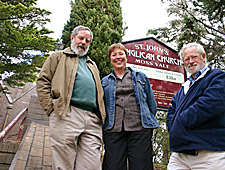 In a community increasingly characterised by loss, Southern Highlands Christians are finding a new form of outreach as locals combat humanity’s age-old enemy.
In a community increasingly characterised by loss, Southern Highlands Christians are finding a new form of outreach as locals combat humanity’s age-old enemy.
The population of Moss Vale is rapidly aging with almost one in five people above the retirement age.
The situation is mirrored across the Wingacarribee Shire.
In ten years the number of people over 90 years of age has increased by more than 141 per cent to 220 out of a total population of 40,840.
For the Rev Warryn Stuckey, Rector at Berrima Moss Vale Anglican Church, a largely elderly congregation and an increasingly aged community are the dominent factors shaping his ministry.
On average, Mr Stuckey holds a funeral in the close knit Southern Highlands community once every two weeks.
This means a large proportion of his pastoral care has centred on visiting the bereaved and those in need support and encouragement.
Death is becoming the single most important evangelistic issue in his Christian community.
With ten parishioners passing away in the last twelve months, many at the church are looking to not only to deal with their own loss, but reach out to others struggling with grief.
"That's why we asked Anglicare if they could hold a Living with Loss seminar at our parish," says Mr Stuckey.
In July Christians from all denominations came to St John's Anglican Church to learn how to help themselves and others cope with grief.
Anglicare’s Community Education and Training Unit Manager, Tony Molyneux, says the seminar is designed to provide a better understanding of the grieving process that's connected to any kind of loss.
“Death is not the only time we experience loss,” he says.
“There are a range of circumstances such as the break up of a relationship, ageing, retirement, ill health.”
Grief has oppened a new door on to the outer community for the congregation.
"Our seminar informs people about the grief process, what happens and what can be expected,” Mr Molyneux says.
“We hope this will help people manage their own, and others', grief and loss reactions.”
Practical tips for pain management
“The one emotional reaction people can expect is pain,” Mr Molyneux explains.
“Not everyone copes with pain in the same way and some find it difficult often covering it with a behavioural change.”
The day-long seminar delves into the varied stages of grief, helping attenders to understand the struggles facing their community.
"Some people experience various stages of depression, anger, crying, denial, distractions, withdrawal, under-eating, over-eating, addictive behaviours, workaholism, obsessive-compulsive behaviours, physiological reactions like headaches, blood pressure problems and stress reactions. The list is long and varied,” says Mr Molyneux.
"All these cover pain which needs to be processed and this takes time.”
Mr Stuckey says most people who attended from Moss Vale and Berrima parish found the day very helpful.
"Many have said that they got a lot more out of it than they expected. I think what's happening is that people are getting in touch with their own unresolved issues. They had come to help others and found that they themselves had some unresolved feelings to deal with."
Sometimes the last thing a Christian would want to hear when they're in pain is a familiar Bible passage trotted out as a form of comfort, he explains.
"I think at the moment you break your leg and feel that excruciating pain, hearing people say that you will be ok in a few weeks may not be all that helpful. It's the same sort of thing with grief.
"For many Christians who face the pain of grief and loss, those verses are information they already have but may not be ready to hear as words of comfort from others. To move to that state involves an acceptance of the situation that some might find difficult to experience so close to their loss."
For more information on Anglicare's Grief and Loss training seminars, call Yvonne Roberts on (02) 9895 8054.



















